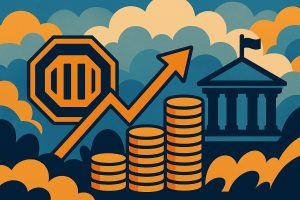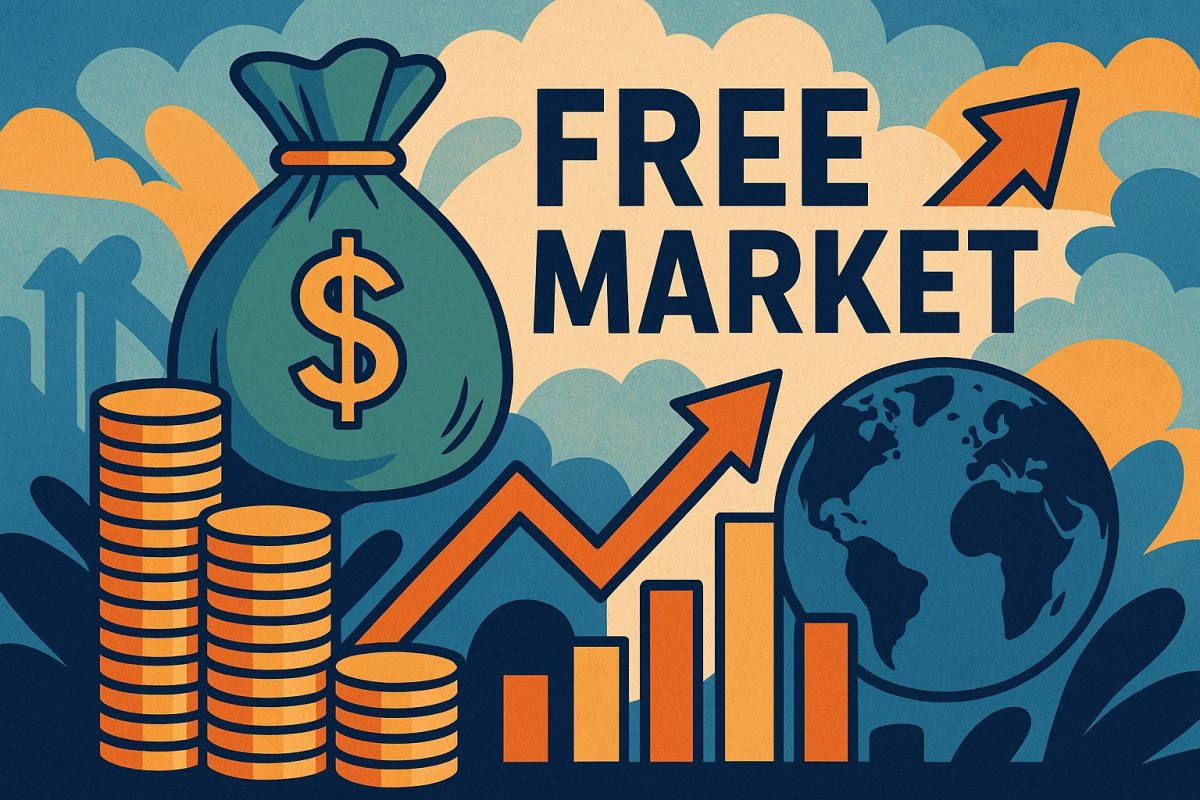Free Markets: More Than an Ideological Slogan
Say “free market” and many people picture Wall Street, speculators, or ruthless capitalism. But for thinkers in the philosophy of individual freedom, it means something much broader.
To them, the market isn’t a playground for big corporations — it’s a network of millions of small voluntary exchanges: from the local baker to the freelance developer, from the bike repair shop to global webshops. The core elements are:
- private property
- voluntary exchange
- prices as information signals
- entrepreneurs taking risks
In this view, the free market is simply the economic expression of personal liberty.
If you own your time, skills, and belongings, you should be free to exchange them with others — as long as you respect their rights.
It sounds philosophical, but the real question is: does it work?
How Economic Freedom Becomes a Growth Engine
1. Knowledge Is Decentralized — and Markets Can Handle That
Friedrich Hayek, one of the most influential pro-market thinkers, argued that no government or planning body can ever possess all the knowledge needed to run a complex economy. Real insights — customer preferences, local conditions, emerging ideas — live in millions of individual minds.
The market solves this through what he called “spontaneous order”:
- Prices compress information (scarcity, demand, opportunities).
- Entrepreneurs react to these signals.
- Good ideas survive; bad ideas fade.
This order isn’t designed by a single authority — it emerges from countless individual decisions.
That’s why markets often outperform central planning: they process distributed knowledge far more efficiently.
2. Competition Drives Innovation
The evidence on this is strong: competition and innovation are tightly linked.
- OECD studies show that strong competition forces companies to innovate, leading directly to higher welfare and economic growth.
- Empirical research finds that competitive environments correlate with higher long-term growth, especially in tech-driven economies.
- Nobel Prize–winning economists Philippe Aghion and Peter Howitt formalized this as “creative destruction”: new businesses and technologies push old ones aside, creating long-term progress.
Free-market thinkers embrace this dynamic: the easier it is for people to start, grow, or fail at business, the more innovative and resilient an economy becomes.
3. Voluntary Exchange Creates Wealth
From a freedom-oriented perspective, the logic is simple: two parties trade voluntarily only if both expect to benefit. That applies to:
- customer ↔ business
- worker ↔ employer
- investor ↔ entrepreneur
The cumulative effect of millions of voluntary exchanges creates prosperity without central administration.
To libertarian thinkers, this is why free markets tend to produce far more wealth over time than centrally planned alternatives.
What Libertarian Thinkers Say About It
Milton Friedman: Freedom + Markets = Prosperity
Nobel laureate Milton Friedman argued that individual freedom, open markets, and a stable currency historically create the highest levels of prosperity.
He linked three ideas:
- Economic freedom (choosing your job, contracts, business).
- Political freedom (reduced risk of authoritarianism when the state doesn’t control the economy).
- Material prosperity (better products, higher living standards).
For him, free markets were not tools for corporate power — they were mechanisms that limit all forms of centralized control, public or private.
Institutions of Economic Freedom
Organizations like the Cato Institute and Libertarianism.org emphasize three pillars:
- strong property rights
- voluntary exchange
- minimal distortion through regulation or political favoritism
The Libertarian Party articulates it clearly: people should be free to earn an honest living through voluntary exchange, without unnecessary licensing barriers or bureaucratic restrictions.
How Free Markets Positively Shape an Economy
1. Higher Growth and Productivity
Innovation research is unambiguous: technological progress is one of the strongest drivers of long-term economic growth.
A freer market — with lower barriers, more competition, and easier entry — accelerates:
- innovation
- productivity
- economic dynamism
In the long run, that translates into rising wages, greater consumer choice, and lower prices.
2. Better Allocation of Talent

When governments impose fewer restrictions (permits, occupational licensing, heavy regulation), people can more easily:
- start their own business
- switch sectors
- combine jobs and side projects
From a libertarian perspective this is morally right — people own their own labor — but also highly efficient: talent flows where it creates the most value.
3. Less Concentrated Power, More Choice
Free markets are often misunderstood as breeding grounds for corporate dominance. Ironically, libertarian thinkers spend a lot of time warning against crony capitalism: a system where businesses gain advantages through political connections.
A truly free market:
- eliminates subsidies and political favoritism
- exposes all companies to competition
- allows consumers to decide who wins or loses
Power still exists — successful companies grow — but it remains temporary and vulnerable to competition.
But Freedom Needs Foundations
Mature free-market thinking isn’t “remove all rules and walk away.”
Economic freedom works best under a few essential conditions:
- Rule of Law
Contracts must be enforceable; violence and fraud must be punished. - Fair competition
No protected monopolies, no corporate bailouts, no closed guilds. - Open flow of ideas and trade
Protectionism and heavy trade barriers slow innovation dramatically. - Safety nets outside centralized control
Many libertarians prefer social support organized through voluntary institutions, insurance models, and civil society rather than heavy-handed state systems.
Conclusion: Free Markets as an Invitation, Not a Dogma
You can critique the current economic system while still recognizing this truth:
Open markets, voluntary exchange, and entrepreneurial freedom are among the strongest engines of prosperity humans have ever discovered.
The philosophy behind economic freedom isn’t utopian.
It simply says:
The more space people have to develop their ideas, trade their skills, and build value voluntarily, the stronger, more innovative, and more resilient an economy becomes.
Not because a central planner designed it —
but because millions of individuals, each acting freely, create something far greater than any authority could ever orchestrate.
Sources:
- Cato Institute — Key Concepts of Libertarianism: Free Markets https://www.cato.org/commentary/key-concepts-libertarianism?utm_source=borderstride.com
- Cato Institute — Mission, Vision & Principles: Liberty and free markets create prosperity and progress https://www.cato.org/about/mission-vision-principles?utm_source=borderstride.com
- Federal Reserve Bank of Minneapolis — Hayek’s Legacy of the Spontaneous Order https://www.minneapolisfed.org/article/1992/hayeks-legacy-of-the-spontaneous-order?utm_source=borderstride.com
- Wikipedia — Friedrich Hayek https://en.wikipedia.org/wiki/Friedrich_Hayek?utm_source=borderstride.com

